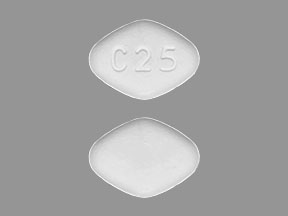Rucaparib Disease Interactions
There are 3 disease interactions with rucaparib.
Rucaparib (applies to rucaparib) hepatic impairment
Moderate Potential Hazard, Moderate plausibility. Applicable conditions: Liver Disease
No dose adjustment is recommended for patients with mild to moderate liver dysfunction (total bilirubin up to 3 times the upper limit of normal [3 x ULN] or AST greater than ULN). Caution should be exercised when using this agent in patients with severe liver dysfunction (total bilirubin greater than 3 x ULN and any AST) as rucaparib has not been studied in these patients.
Rucaparib (applies to rucaparib) MDS/AML
Moderate Potential Hazard, Moderate plausibility. Applicable conditions: Bone Marrow Depression/Low Blood Counts
Cases of myelodysplastic syndrome (MDS)/acute myeloid leukemia (AML) have been reported with the use of rucaparib. Rucaparib should not be started until patients have recovered from hematological toxicity caused by previous chemotherapy (grade 1 or less). It is recommended to monitor complete blood counts for cytopenia at baseline and monthly thereafter for clinically significant changes during therapy. For hematologic toxicities exceeding 4 weeks, rucaparib should be interrupted or the dosage reduced according to the manufacturer product information; blood counts should be monitored weekly until recovery. If levels have not recovered to grade 1 or less after 4 weeks or if MDS/AML is suspected, the patient should be referred to a hematologist for further investigations (including bone marrow analysis and blood sample for cytogenetics). If MDS/AML is confirmed, rucaparib should be discontinued.
Rucaparib (applies to rucaparib) renal impairment
Moderate Potential Hazard, Moderate plausibility. Applicable conditions: Renal Dysfunction
No dose adjustment is recommended for patients with mild to moderate renal dysfunction (CrCl between 30 and 89 mL/min [as estimated by Cockcroft-Gault method]). Caution should be exercised when using this agent in patients with severe renal dysfunction (CrCl less than 30 mL/min) or patients on dialysis as rucaparib has not been studied in these patients.
Switch to professional interaction data
Rucaparib drug interactions
There are 745 drug interactions with rucaparib.
Rucaparib alcohol/food interactions
There is 1 alcohol/food interaction with rucaparib.
More about rucaparib
- rucaparib consumer information
- Check interactions
- Compare alternatives
- Reviews (1)
- Side effects
- Dosage information
- During pregnancy
- Drug class: PARP inhibitors
- Breastfeeding
- En español
Related treatment guides
Drug Interaction Classification
| Highly clinically significant. Avoid combinations; the risk of the interaction outweighs the benefit. | |
| Moderately clinically significant. Usually avoid combinations; use it only under special circumstances. | |
| Minimally clinically significant. Minimize risk; assess risk and consider an alternative drug, take steps to circumvent the interaction risk and/or institute a monitoring plan. | |
| No interaction information available. |
See also:
Further information
Always consult your healthcare provider to ensure the information displayed on this page applies to your personal circumstances.


